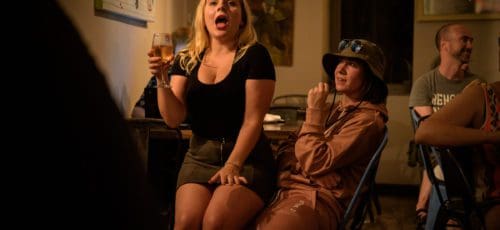An Unlikely Playwright
 Reuben Wade strikes one as an unlikely playwright. For years, he worked in building design and remodeling in Providence, R.I., before moving on to get an engineering degree at the University of Kansas. He moved to Philadelphia in 1998, and now works with the U.S. Army Corps of Engineers, primarily on Superfund sites and ground water treatment.
Reuben Wade strikes one as an unlikely playwright. For years, he worked in building design and remodeling in Providence, R.I., before moving on to get an engineering degree at the University of Kansas. He moved to Philadelphia in 1998, and now works with the U.S. Army Corps of Engineers, primarily on Superfund sites and ground water treatment.
“I refer to myself in my office at the Core of Engineers as an infiltrator. I hung out with artists most of my life. I employed RISD students, for example. I self-trained to the building trade from a creative point of view; we were designing most of our projects. I always had to have a project and didn’t know how to live without one. Writing is much cheaper as long as I don’t produce plays,” he jokes. Well, half-jokes. But more seriously:
“It seems completely natural to go from creating spatial environments to creating a story,” Reuben says. “I’ve never had more fun.”
That fun, for the 2012 Philly Fringe, takes the form of a staged reading of his play Paint the American Eagle, the story of Charles Dickens’ insights into life in the United States.
After the jump: learning fiction, investigating the Charles Dickens family, and moving on to Einstein.
Reuben started writing in 2006, he says, “probably having the same stupid ideas many have about being a fiction writer.” He took a non-credit class at Temple with Ken Bingham, and fell in love with the ability to manipulate fictional worlds.
“What surprised the heck out of me was just how much fun I’d have writing fiction! So I began to write short stories, and started several novels. In 2009 I decided to write a play—I was inspired by the Fringe—it opened my mind to a lot of possibilities,” in the decade he had been attending shows, Reuben says.
“Fifteen years earlier I had read Dickens’ American Notes. In 1842, what Dickens saw in the United States seemed really familiar to me—the discussions they were having, the attitudes about government, the nature of some of the institutions he saw. I get the same reaction when I read Mark Twain; it doesn’t seem as different as I thought it might,” he says.
“I thought it would be cool to bring out a book that nobody knows about. [Dickens’ wife] Catherine was along on the trip. I began to fictionalize what a Victorian woman from that age might have experienced as she went through the United States. I was essentially writing a monologue, and what I found was that I wrote a play.”
His contacts at Theatre Exile—he’s been on its board since 2007, and has been its chair for three years—helped him sort out exactly what kind of project he had on his hands.
“Brenna Geffers showed me that it could be a four-part play—with a highlighter, without changing a word, she turned it into a four-part play,” he says.
A fictitious history professor offers a historical presentation to the audience, and announces he has a special guest to bring in, and it’s Catherine Dickens. Along the way, her daughter Kate shows up, as does Charles.
“It’s been interesting to bring to light their negative family interactions. Dickens was such a fabulous writer and so interested in justice, but he didn’t always apply it to his family. Professor Harris [the fictitious history professor] is quite delighted with what happens,” according to Reuben.
The staged reading will happen at the Central Library on Vine Street, the first time that the main branch of the library has hosted a Philly Fringe production. And a natural fit it is, as part of the library’s “A Year of Dickens” program celebrating the 200th anniversary of the birth of Charles Dickens. The first two performances of Paint the American Eagle will occur on the ground floor of the library, before moving into the Montgomery Auditorium for what Reuben anticipates will be a much larger afternoon audience.
“We’ll try to bring high school students that day, and we expect to fill it pretty well. The challenge will be to entertain that younger audience,” he says. All of the readings are free, because, as Reuben says, “that’s how they do things.” And for him, that’s OK: “It’s a matter of love and art, and all that.”
Love and art have grounded Reuben in Philadelphia, too, he says. “Philadelphia is home from here on out. A lot of it is the theater community. Here, I found a home; I had always thought I’d move on to somewhere else.”
While the Dickens project is still active, projects always move on; next up is the story of a female physicist from the 1950s whose theories challenge those of Albert Einstein.
“It takes place in 1955 in the last few weeks of the life of Einstein. She’s a Ph.D. candidate at Princeton who is seeking support from Einstein. She’s developed a theory about the nature of time that contradicts Einstein’s theories. A young son of hers left a memoir or journal; from his journal, there’s some evidence of her meeting with Einstein and their discussion. It’s fun, because I have to write faux physics for her to have a conversation with Einstein. And there are other issues: Einstein and his first wife, raising a child alone in the 1950s, in addition to the nature of time.”
Paint the American Eagle runs September 10 and 11 at 7:00 pm, and September 12 at 2:00 pm at the Central Library, 1901 Vine Street, Logan Square. Free!
–Nicholas Gilewicz




